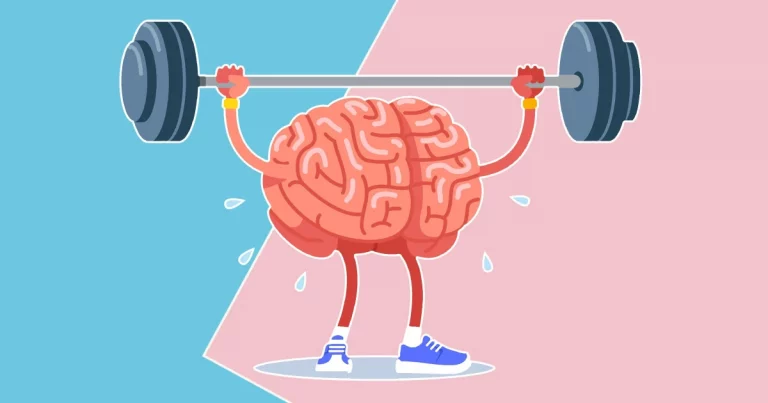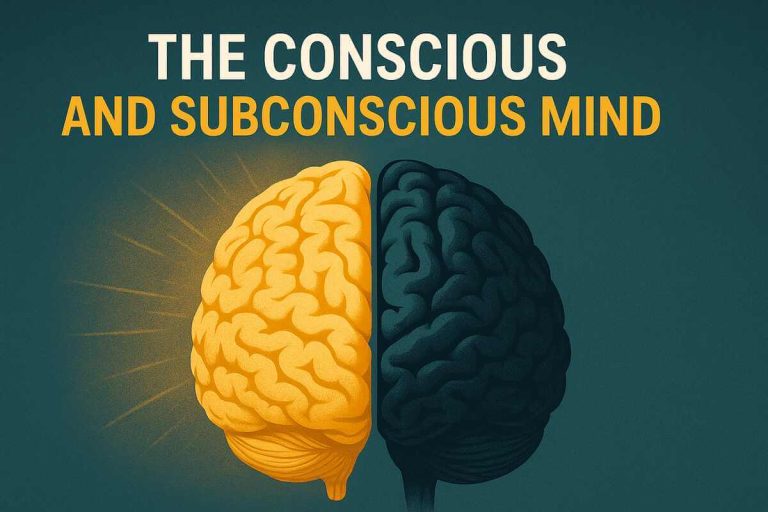Given a choice, would you rather be born extraordinarily intelligent or fantastically persistent?
On the one hand, only the smartest percentiles qualify for top universities and careers. On the other, history’s highest achievers, from Abraham Lincoln to Michael Jordan, all share a common burning desire to achieve what to many would appear impossible. But is one more favorable than the other when it comes to achieving success?
Many studies have drawn conclusions both for and against the role of intelligence in long-term success. But the truth is that they are not in competition, so we should not think of it as such.
It is not a zero-sum affair; the abundance of one does not mean the absence of another. And data suggests that both are important to estimate a person’s success.
But there is a key point that all these studies miss. While intelligence correlates to future performance, science shows our time is wasted trying to improve it. Improving our persistence is the key to greater success.
What is Intelligence and IQ?
Short for intelligence quotient, IQ is a total score derived from a set of standardized tests designed to assess a person’s intelligence. You most likely would have participated in an IQ test if you had to qualify for any school or university placement and even some jobs.
It is important to note that IQ tests are merely estimates of intelligence. It is an indirect measure and the validity of the results has been questioned by many studies.
Two people of identical intelligence could test differently on an exam because of various external factors, such as stress, energy levels, and general experience under exam conditions.
One of the main aims of IQ is to estimate as best as possible a person’s reasoning and problem-solving skills. In theory, the quicker we can solve problems the greater our intelligence.
Typically these tests have been used for educational and workplace evaluations, such as SAT and ACT scores.
Educational evaluations based on IQ tests are declining in popularity, however, because of the unfair pressure these exams place upon young students, and the complete lack of consideration for other essential skills, such as perseverance and organization, that higher education also requires.
This is a welcome change in places such as China and India where children are placed under extreme pressure to enter leading institutions, where a person’s future success can be significantly affected merely by association with some top universities.
What About Emotional Intelligence?
IQ is just one of four quotients to measure intelligence, the others being the emotional quotient (EQ), social quotient (SQ), and adversity quotient (AQ).
Of particular interest is emotional intelligence, the ability to perceive, understand, manage, and use emotions effectively in oneself and others to navigate social interactions and relationships.
Emotional intelligence is just as important to success as the other types of intelligence because of its role in enhancing interpersonal relationships. Traits such as communication and empathy contribute to more effective collaboration and conflict resolution, two soft skills that are vital for working your way to the top.
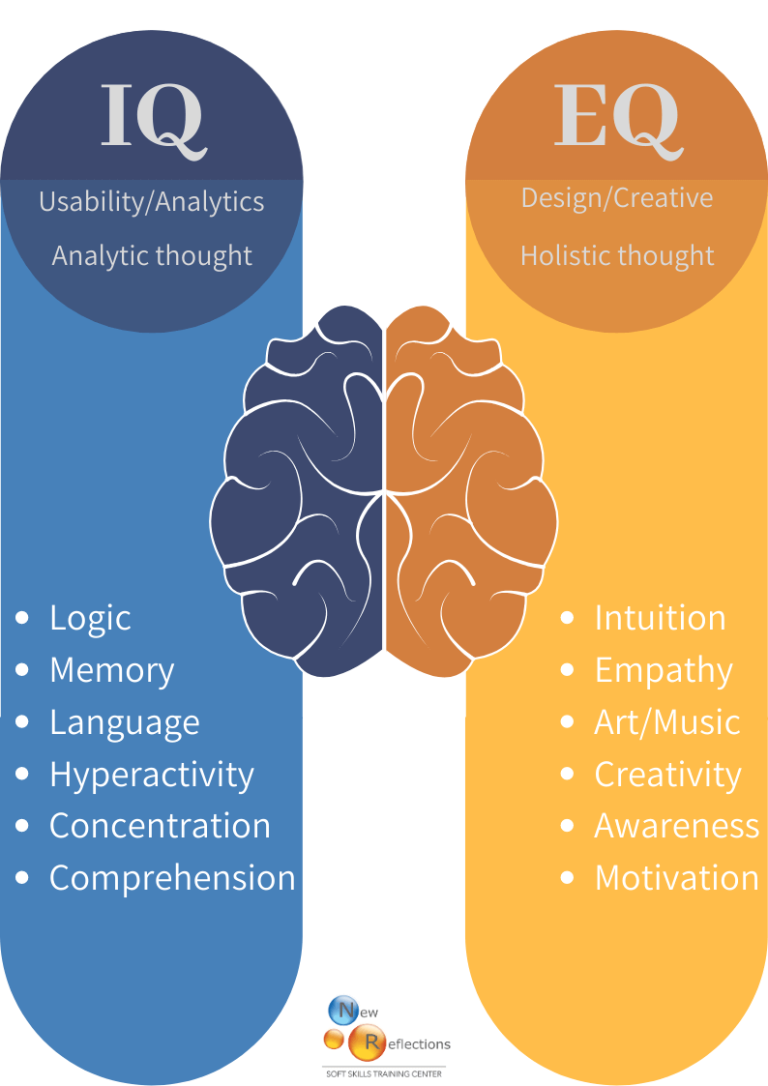
IQ – Is Intelligence Genetic or Developed?
Despite the huge number of brain training aids available for sale, from books to games (and even pills), numerous studies have mostly led to the same conclusion – IQ is partially hereditary and difficult to improve.
Researchers at Kings College London deduced a positive correlation between IQ and genetics. Using a sample of 11,000 sets of twins at age 16 (a mix of identical and non-identical) between 1994 and 1996, various traits were tested, including health, happiness, and satisfaction at school.
Nine general traits, intelligence being one of them, were identified as highly hereditary, with identical twins more likely to share these traits than non-identical twins.
Interestingly, 62% of the individual differences in GCSE scores (the college admission exam in the United Kingdom) were attributed to genetic factors. Numerous other studies attempting to test the same hypothesis found similar results.
We can’t control being born intelligent, that much is up to chance. But can we actively improve it? On the positive side, average IQ Scores across western Europe, Japan, and South Korea rose by an average of three points per decade until the 1990s.
Experts ascribe this increase to improved nutrition, better schooling, fewer infectious diseases, and a more stimulating environment. This shows that IQ can be increased at least slightly over a long time by indirect effects, such as a healthier environment.
But on an individual level, increasing IQ in a meaningful way does not look hopeful. One long-term study found that it took five years of intensive intervention in infancy to increase IQ by only a few points. And the older we get, the harder it seems to become.
Although possible, the years of intense work required to yield just a few additional IQ points are likely not worth it. As a side note, a study by the University of South Wales found that aerobic exercise was one of the most effective intelligence boosters, due to the increase of hormones responsible for developing new brain connections.
Are Intelligence and Success Linked?
So we know what IQ is, that it is mostly hereditary, and that there is little we can do to meaningfully improve it. The last question we need to know is whether IQ has any significant impact on one’s future success.
This is a difficult question to answer with any certainty for multiple reasons. Firstly, success covers many areas, including financial success, happiness, health, and relationships. Secondly, not every type of success can be easily measured, especially by IQ scores.
The easiest form of success to measure, however, and perhaps the most in demand, is financial/career success.
It may be of little surprise that IQ has been found to correlate with economic success. For example, a 2004 study found IQ to be a reliable predictor of both career level and success in their field.
Employees from higher IQ percentiles tended to have more prestigious titles and move up the corporate ladder quicker, with the reason for this trend suggested to be the ability of higher IQ employees to pick up new skills more quickly.
An oft-cited study from Jay Zagorsky (Zagorsky, Jay, 2007. Do you have to be smart to be rich? The Impact of IQ on wealth, income and financial distress. Intelligence 35: 489-501) found that for each point increase on an IQ score, annual income increases between $235 and $616.
Although a correlation exists, it is highly variable and dependent on many factors, such as an individual’s persistence, network, and culture.
It is also worth noting that in this same study, financial distress, such as credit card debt, problems paying bills, and filing for bankruptcy, is related to IQ scores not linearly, but quadratically. This means that the extremes of IQ scores (both the extreme highs and lows) increase the probability of being in financial difficulty.
Why the extremely intelligent are correlated with financial difficulty is open for speculation, but the tendency to overthink (which often leads to analysis paralysis) and the tendency to dwell on important decisions for too long may play a part.
What is the Persistence Quotient (PQ)?
The facts so far: intelligence is mostly determined by genetics, is difficult to improve by any significant amount, and a higher IQ correlates with greater career success. This is great news for those blessed to be born intelligent, but what about the rest of us?
Do not fear, the persistence quotient (PQ) is here to save us. For PQ purposes, we define persistence as firm continuance in a course of action despite difficulty or opposition. In a practical sense, it measures our ability to “keep calm and carry on”.
Whereas science shows that IQ is difficult to meaningfully improve, it has also shown that PQ is less resistant to change.
Angela Duckworth, researcher and author of the best-selling book “Grit,” maintains that success has a greater correlation with perseverance and hard work than it does with innate talent or intelligence.
Research has also found that Japanese children consistently scored higher than their American counterparts.
While many would assume this to be because of Japanese children’s greater proclivity for maths, Mark Batterson, pastor, and best-selling author noted in his book “The Circle Maker” that Japanese children tended to persevere with puzzles for a greater amount of time.
On average, American children lasted 9.47 minutes when trying to solve a puzzle. The Japanese children, on the other hand, lasted an average of 13.93 minutes. In other words, the Japanese children persevered for 47% longer.
Researchers naturally concluded that the difference in math scores might have less to do with intelligence and more to do with persistence. The Japanese first-graders simply tried harder, as is encouraged more in Japanese culture.
In this same book, Batterson quoted neurologist Daniel Levitin — “The emerging picture from such studies is that ten thousand hours of practice is required to achieve the level of mastery associated with being a world-class expert – in anything. In study after study of composers, basketball players, fiction writers, ice skaters, concert pianists, chess players, master criminals, and what have you, this number comes up again and again…No one has yet found a case in which true world-class expertise was accomplished in less time. It seems that it takes the brain this long to assimilate all that it needs to know to achieve true mastery.”
This is excellent news for those of us who may not have been born among the most intelligent, and for those who are determined to achieve whatever they wish, come what may. Determination beats intelligence most of the time.
Intelligence Vs. Persistence
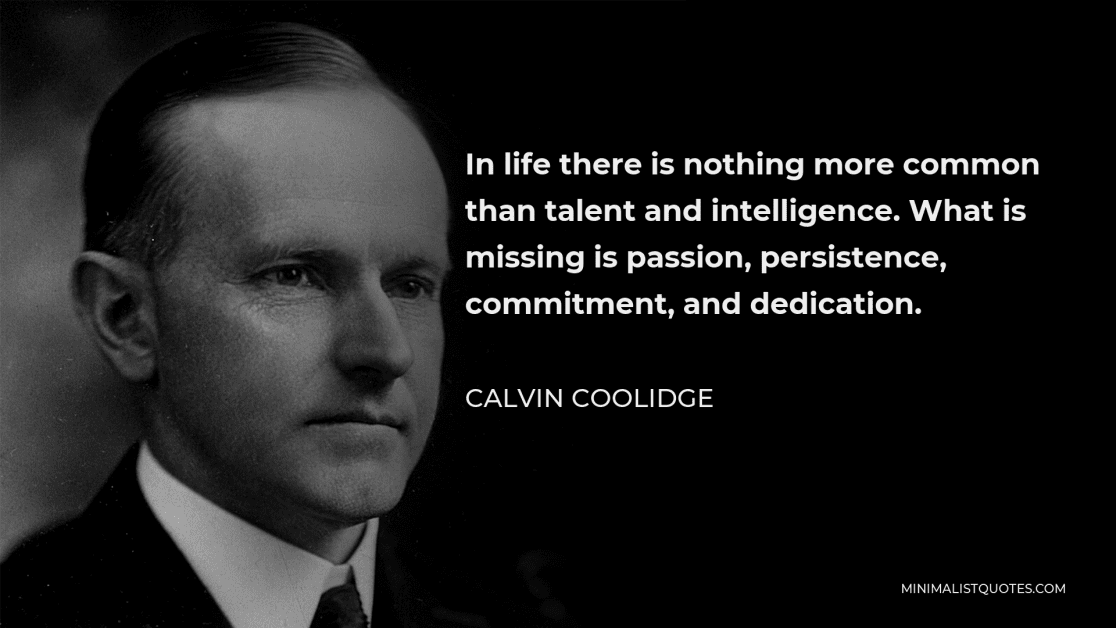
Calvin Coolidge once said, “Nothing in the world can take the place of persistence. Talent will not — nothing is more common than unsuccessful men with talent. Genius will not — unrewarded genius is almost a proverb. Education will not — the world is full of educated derelicts. Persistence and determination alone are omnipotent. The slogan ‘Press On!’ has solved and always will solve the problems of the human race.”
While there is no accurate way to quantify a person’s persistence, it is hard to dismiss Coolidge’s take on it. We know a determined person when we see one, and few top-tier athletes, executives, and entrepreneurs will have made it without a certain level of persistence, intelligent or not.
Ignorance can truly be bliss when we avoid overthinking. Intelligence leads to thinking about all the different risks and ways things can go wrong. The negativity bias expands upon this point, where we naturally focus more on the negatives than the positives and give them a larger weight.
The higher the IQ, the more ways you can think about what can go wrong, and the more the subconscious mind can talk itself into backing out.
IQ and PQ can be thought of as the fable of the hare and tortoise. The hare (representing intelligence), can run faster and technically finish a race in a quicker time but is prone to stopping often.
The tortoise (representing persistence), on the other hand, doesn’t stop until the race is finished. And success is not a race; whether it is achieved in one year or ten doesn’t matter, what matters is that you persevere and finish.
This analogy is more accurate than you might think. Intelligent people often succumb to analysis paralysis and stop or stall many times. Often, the less you think the more likely you are to persevere.
The key takeaway from this article is that there is little point in focusing on improving our IQ when science suggests it is very difficult to substantially improve.
If success could be boiled down to an equation, it would be:
Success = Intelligence (IQ) x Persistance (IQ)
If we can only increase IQ by a max of 10%, but we can increase PQ by hundreds of percent, then we are wasting time trying to improve intelligence when it provides minimal benefit in return. Instead, we should think of intelligence as a constant, already set in stone by our genetics, for better or worse.
What we should spend our time on, therefore, is improving our persistence, where we can obtain a greater return on our time invested.
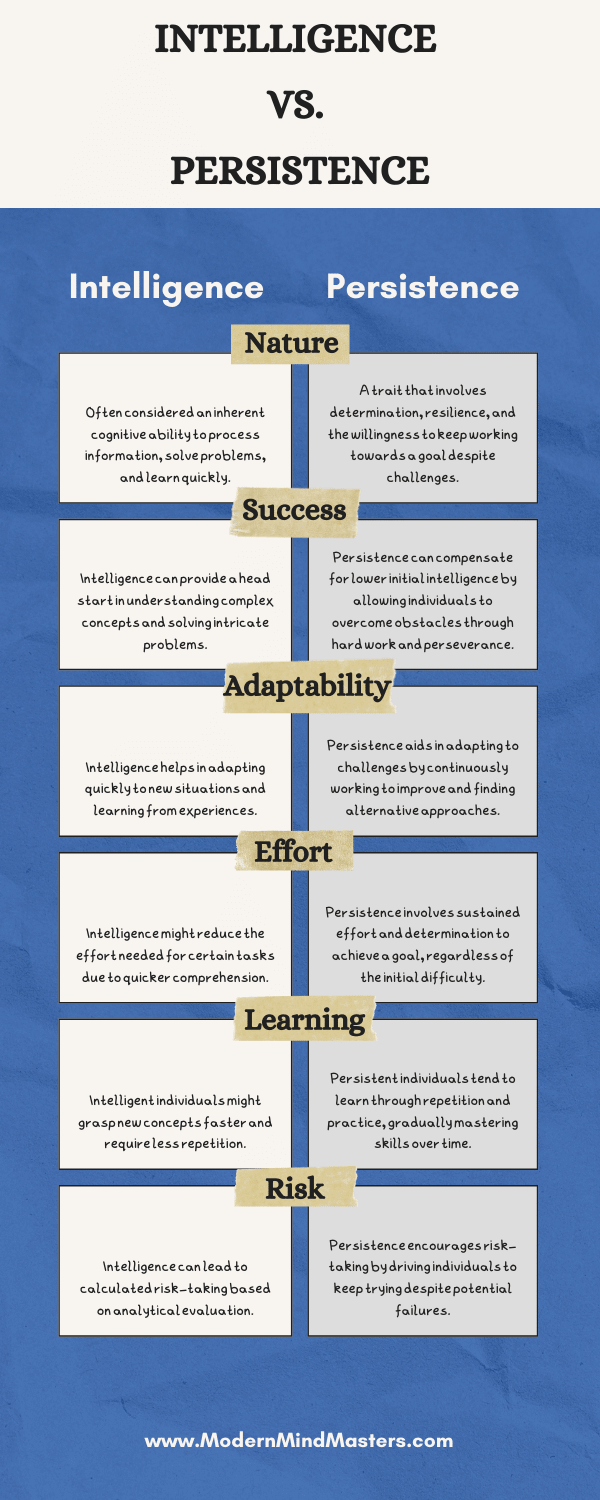
How to Increase Persistence
There is no quick and easy way to increase our PQ. It is like any other skill that must be practiced extensively, with small continuous improvements compounding over time. And the topic is so large an entire book could be written about it (and most likely has). But we can take a few key steps to train our resilience starting right now.
1) Set a Clear Vision/Goal
Goals are life’s compass, ensuring we have the means to stay on course when life inevitably throws us off.
Think of success as sailing across the ocean; without a compass (our goals) we simply pick a direction and hope it leads to where we need to go, with no idea how far we have come or how much further we have to go. For all we know we could be sailing in circles and never reach land at all.
By setting measurable goals we provide ourselves a way of measuring where we have come from and where we are going. Life will throw any number of storms at us at any time, but we have to be able to find a way to get back on track. Without it, we are much more likely to give up at the first sign of trouble.
2) Hold Yourself Accountable
With no rewards or punishment, we cannot be engaged. Set yourself quantifiable goals with exact measures of when you should achieve them. For example, when starting a business, set yourself targets, such as reaching out to 100 potential clients by July 31st.
If after 1 month you have only reached out to 10, you know you need to make a direct change in order to hit your target. Perhaps you need to increase the amount of time dedicated to contacting new clients. If you have no time, you will need to outsource to someone who can.
Understand that change rarely happens without taking direct action. Persistence is active, luck is passive.
3) Don’t be Afraid to Pivot
Persistence must be applied smartly, and not forcefully. Don’t suffer the same mistake as Blockbuster, by continuously trying to rent DVDs when online streaming is taking over the market. There is a big difference in results between smart and forceful persistence.
By setting goals, and holding yourself accountable for results, you have a way of measuring your progress. You will find out one of two things; either you are hitting your targets or you are not. If you are not, you need to identify whether it’s because you are not attacking them aggressively enough, or whether you set the wrong goals.
Be honest with yourself to determine whether you need to pivot your goals. Perhaps your goals will yield better results if you reach out to ten industry-specific clients as opposed to cold-calling 100 random businesses. For every problem there are usually multiple solutions, the key is being honest enough with yourself to identify them.
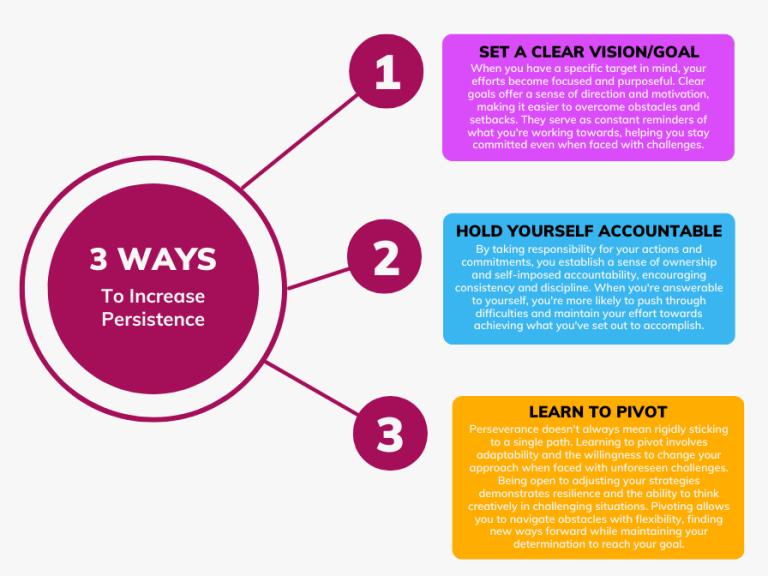
Conclusion
There may be some hard truths to swallow here, but the main message should be nothing but inspiring.
Intelligence seems to be related mildly to success, with higher IQ scores correlating with higher financial success.
But this small effect is massively outweighed by the potential success achievable through strong persistence. This, compounded by the fact that intelligence is difficult to meaningfully improve, means our effort is almost always better spent improving our PQ.
Fortunately, persistence is easier to improve, as long as we are honest with our abilities and goals, and have the mental resilience to accept failure not as an endpoint, but as an opportunity to pivot, we will improve. It requires that we lower our egos and become accountable for measuring our progress.
So there you have it. Stop fretting about whether you are intelligent enough to achieve your goals. It matters little compared to persistence. Your success is determined by how willing you are to accept your responsibility for pushing your goals, and little else.
FAQs
What is Persistence?
We define persistence as firm continuance in a course of action despite difficulty or opposition. In a practical sense, it measures our ability to “keep calm and carry on”.
Are high IQ people more successful?
It may be of little surprise that IQ has been found to correlate with economic success. For example, a 2004 study found IQ to be a reliable predictor of both career level and success in their field.
Employees from higher IQ percentiles tended to have more prestigious titles and move up the corporate ladder quicker, with the reason for this trend suggested to be the ability of higher IQ employees to pick up new skills more quickly.
Is perseverance more important than intelligence?
Persistence can be improved and has been shown to correlate to success to a much larger degree than intelligence.
